What should a new podcast be about? Justin Jackson (Transistor.fm) helps me figure it out.
Am I overthinking this new podcast? Should I stick to a tried-and-true format?
These are the questions you may face when launching a new podcast and.. There isn't any single correct answer to these questions! Justin Jackson, co-founder of Transistor.FM, helps me sort through all these creative content ideas in episode #1 of Open Threads.
These are the questions you may face when launching a new podcast and.. There isn't any single correct answer to these questions! Justin Jackson, co-founder of Transistor.FM, helps me sort through all these creative content ideas in episode #1 of Open Threads.
Brian and Justin's conversation was recorded on April 11, 2022.
Creators and Guests

Host
Brian Casel
Teaching product skills at https://t.co/slTlMF8dXh | founder @Clarityflow | co-host of https://t.co/pXrCHLdDwe

Guest
Justin Jackson
⚡ Bootstrapping, podcasting, calm companies, business ethics. Co-founder of @transistorfm (podcast hosting).
